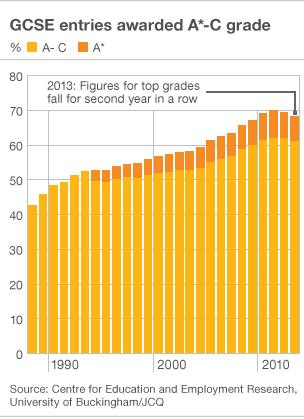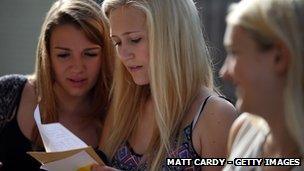GCSEs 2013: Top grades fall for second year in a row
- Published
Pupils in Paddock Wood, Kent, opened their results in front of the BBC's Carrie Gracie
There has been a drop in the proportion of GCSE exam entries awarded top grades, for the second year in a row.
More than 600,000 teenagers in England, Wales and Northern Ireland are receiving results, with head teachers saying changes have caused "a lot of turbulence" in grades.
About two-thirds of exam entries were graded between an A* and a C - a fall on last year.
And the proportion getting an A* or an A fell from 22.4% to 21.3%.
The overall pass rate also fell marginally, for the first time in the exam's 25-year history.
The results - released by the Joint Council for Qualifications, external (JCQ) - also show more pupils are taking exams early (particularly in maths and English), a rise in re-sits and teenagers being entered for more than one exam in the same subject.
'Damaging trend'

The JCQ says these early entries are partly responsible for the drop in results because 16-year-olds are outperforming younger pupils, together with falls in science grades.
It says they are a "damaging trend", not in the best interests of pupils and driven by the league tables, where schools are measured on how many pupils get at least a C grade in English and maths.
In English, the proportion of entries awarded A*s to Cs fell by 0.5 percentage points, to 63.6%. In maths, the fall was 0.8 percentage points.
There was a big fall in pupils getting top grades in all the sciences, following the introduction of new syllabuses and exams.
This year 53.1% of science entries were awarded between an A* and a C, down from 60.7% last year. That drop - of 7.6 percentage points - was the biggest fall in top results across all the subjects.
Smaller falls were seen in the separate sciences and in additional science too.
The results also show an increase in those taking foreign languages and humanities at GCSE level.
This trend is likely to be linked to the introduction in the autumn of 2010 of a new league table measure, known as the English Baccalaureate, which now rates schools on how many pupils get good GCSEs in such subjects, as well as sciences and English and maths.
Entries for geography jumped by 19.2% this year, while those for history rose 16.7%.
Entries for traditional modern foreign languages - French, German and Spanish - are up by 16.9% compared with last year, reversing a long-term downward trend.
GCSEs in numbers
-
Pass (A*-C) 68.1%
Star performers (A*)
Girls
8.3%Boys
5.3% -
Science gets tougher
A*-C grades -7.6%
-
More study languages
French +15.5%
German +9.4%
Spanish +25.8%
Education Minister Elizabeth Truss said: "It is very pleasing to see the increase in these important subjects - the ones that will keep pupils' options open in the future. I am particularly delighted to see a languages revival.
"The EBacc is the platform for young people to go on to A-levels and high-quality vocational study. It will help them compete with their peers in the world's best education jurisdictions."
'Significant turbulence'
Michael Turner, director of the JCQ, said: "There are many underlying factors affecting this year's GCSEs, including a sizeable increase in entry by 15-year-olds, new science specifications designed with greater challenge, early and multiple entry in mathematics and an increase in the number of students taking IGCSEs [international GCSEs].
"All of these have had an impact on results," he added.
The BBC's Hywel Griffith speaks to students collecting their results at Rhydywaun school in Wales
Brian Lightman, head of the Association of School and College Leaders, said: "There's lots of good news, particularly that schools, students and teachers have worked really hard in a constantly changing and turbulent environment.
"There has been a lot of turbulence, a lot of unpredictability.
"A number of trends are to be welcomed, for example the increase in languages. There's no doubt the E-Bacc [English Baccalaureate] has had an impact on these subjects."
He added: "It is clear that the bar has been raised on grading in key subjects this year, especially in science. We don't object to making GCSE grading tougher but it needs to happen in a planned, coherent way that is understood by employers, universities and parents. The piecemeal changes we've had in the last few years make it impossible to compare grades from one year to the next."
'Distorting standards'
Mary Bousted, head of the ATL teachers' union, said it was worrying that the overall pass rate for GCSEs had fallen for the first time and that the proportion of exam entries graded between an A* and a C had dropped too.
"If pupils and schools are working harder and harder to achieve grades A* to C they cannot be penalised for doing so by having fixed pass rates," she said.
"This puts schools in the invidious position of never being able to achieve what is demanded of them."
Conservative MP and chairman of the Commons education committee Graham Stuart, said standards should be maintained: "All this work goes into gaining these qualifications. If those qualifications lose currency, if there's a form of inflation going on then that undermines all the hard work...
"There's broad support for saying that we must maintain standards over time."
Shadow education secretary Stephen Twigg said: "There has been a big increase in the number of young people taking two or more exams in the same subject. This is bad for standards, school budgets and learning. Michael Gove needs to get a grip on the multiple entry exam practice that is distorting standards.

Students opening their results as headteachers warned of turbulence in grades
"We need an exam system that maintains standards year on year, accurately reflects pupil performance and that employers, universities, parents and young people have confidence in."
Marking and grading has been tightened for English following an outcry and a legal challenge by schools over the grading of last year's results and extra marks were given this year for good spelling and grammar in some subjects.
Ofqual says it is maintaining standards and that students are getting the "right results".
Across the UK, the biggest falls in GCSE entries scoring top grades (both A* to C and A and A*) were in England.
In Wales, there was a slight fall in the A* to C group, but the proportion of entries awarded an A or A* remained unchanged on last year at 19.2%.
In Northern Ireland, there was a rise on both measures. A total of 28% of entries were graded A or A*, compared with 21.2% in England.
- Published22 August 2013
- Published22 August 2013
- Published22 August 2013
- Published22 August 2013
- Published22 August 2013
- Published19 September 2013
- Published22 August 2013
- Published22 August 2013
- Published22 August 2013
- Published21 August 2013
- Published21 August 2013
- Published20 August 2013
- Published13 July 2013
- Published15 August 2013
- Published15 August 2013